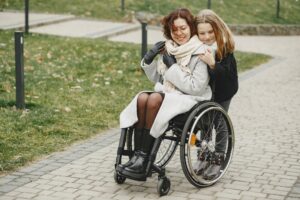By: Cassandra Brandt
Of the almost 18,000 Americans who experience a new spinal cord injury (SCI) each year, thousands of these survivors are parents.
Before the car accident, the dive gone awry, the fall, they assumed the daily duties of raising their children.
With a spinal cord injury, depending on the level and severity, not only do these individuals lose the ability to care for their own body, but for their dependents as well.
Suddenly rendered incapable of tying shoes and packing lunches, the typical duties of the parent must be shifted to the able-bodied parent, if one is present, or to other family members.
For parents of very young children this might look like hiring help or relying heavily on family.
The shifted dynamic can cause confusion for children, and frustration for parents who are forced to watch other people fill their shoes.
I tried not to let my identity or my role as a mom become limited after my injury.
Of course, there were many things I couldn’t do anymore: drive her places, go camping and hiking and swimming like we used to. She had just turned thirteen, but I couldn’t paint her fingernails or do her hair for school dances. Later, she couldn’t call me to pick her up from a party to make sure she got home safe.
I could barely keep the rent paid and utilities on so there wasn’t extra money for good times either. For many parents, with paralysis comes financial instability. Careers can be lost and medical bills outrageous. Money for fun activities likes sports and vacations can be hard for people with disabilities to provide for their children.
So how can we connect with our kids?
In many cases physical affection is out of the picture after SCI too, and the inability to hug and snuggle damages the bond between parent and child.
In some cases, our children provide our care at times, and it’s important they aren’t over-burdened, which can destroy relationships.
I spoke with several paralyzed parents, and we discussed what’s worked for us.
Communication is the most important value we found. It’s communication that gives our children the sense that we respect them as people. When children feel respected, they’re likely to reciprocate.
Respect changes things. When you can’t lose your temper and slam doors and yell and spank, the alternative, you’ll find is much healthier.
I knew I had my child’s respect when she handed me her phone when I grounded her, instead of stomping downstairs to her room where my wheelchair couldn’t go.
In addition to good communication, affection is important. If you can’t hug, be hugged. Give kisses. Show affection with your tone of voice and compliments.
Making our children feel loved is so important for their development and our primary role as parents.
It’s more important than tying shoes and cutting off the bread crust.
I don’t let those little things take away from who I am as a mom. I don’t let my spinal cord injury take away from me being the best mother I can be.
I remain emotionally available to my daughter. I validate her feelings. I help with a few groceries when I can. I help her work on herself as a young mom, because although she’s grown now, my role as hers isn’t over.
Paralysis doesn’t mean the end of parenting, either.

